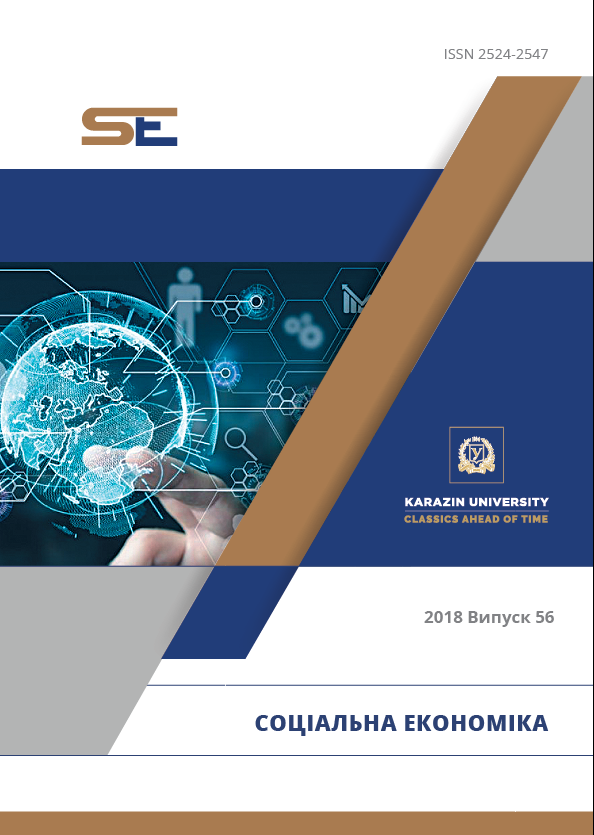Ecological Accounting: Objects, Methods and Reporting
Abstract
The rapid growth of the importance of ecological information in the decision-making process by all stakeholders, as well as ensuring the development and increase of the investment attractiveness of enterprises caused the emergence of ecological accounting.
The article considered the main prerequisites for the emergence and development of accounting, which is focused on the accumulation and use of information on the activities of the enterprise in the field of nature management. The content of the concepts «ecological costs», «ecological accounting» from the point of view of various scientists is researched. According to the research, the concept of «ecological accounting» is proposed, namely: ecological accounting is a system that can be used to identify, organize, regulate and display data and information on the state of the environment in terms of natural and value. The list of objects of ecological accounting is given, as well as their constituent parts are considered. Methods of ecological accounting are disclosed, in particular, methods of accounting, statistical accounting and ecological-parametric methods. A list of reporting was proposed, which should timely, systematically, fully, comprehensively, accurately, continuously, clearly visualize ecological information. The main obstacles to the implementation of ecological accounting at enterprises are disclosed. A great deal of attention is devoted to the concept of «ecological services», as well as four main categories of eco-services (providing, regulating, cultural and supporting services).
It is concluded that ecological accounting is a part of the traditional accounting system of the subject of economic activity. The practical use of the results of this study can in many ways contribute to a more reliable determination of the effectiveness and efficiency of the ecological activity of the enterprise.
Downloads
References
Morozova, E.V. (2007). Classification of costs for environmental management and environmental protection [“Klassifikatsiya zatrat na prirodopol’zovanie i okhranu okruzhayushchey sredy”]. Sovremennye naukoemkie tekhnologii, 9, pp. 40‒41.
Gusakovskaya, E. G. (2004). Accounting for environmental expenditures [“Uchet raskhodov na prirodookhrannuyu deyatel’nost’”]. Bukhgalterski yuchet, 22, pp. 22‒26.
Saenko, K. S. (2005). Accounting for environmental costs [“Uchet ekologicheskikh zatrat”]. M.: Finansy i statistika.
Murueva, E. K. (2007). Environmental aspects of accounting (for example, the forest sector): dis. ... Cand. econ of science [“Ekologicheskie aspekty bukhgalterskogo ucheta (na primere lesnogo sektora ekonomiki): dis. … kand. ekon. Nauk”]. Sankt-Peterburg.
Kirsanova, T. A., Kirsanova, E. V. and Luk'janihin, V. A. (2004). Ecological controlling ‒ environmental management tool [“Jekologicheskij kontrolling – instrument jekomenedzhmenta”]. Sumy : OAO «SOT» Izd-vo «Kozac'kij val».
Chhutiashvili, L. V. (2012). Ecological Accounting in Russian Organizations in Market Economy [“Jekologicheskij buhgalterskij uchet v rossijskih organizacijah v rynochnyh uslovijah hozjajstvovanija”]. Upravlencheskij uchet, 11, pp. 69–78.
Kozhukhova, O. S. (2012). Environmental accounting and environmental controlling: correlation and integration [“Ekologicheskii uchet i ekologicheskii kontrolling: vzaimosvyaz’ i integratsiya”]. [online] Available at: http://www.uecs.ru/uecs-39-392012/item/1165-2012-03-26-11-23-42 [Accessed 27 Nov. 2018].
Pelinho, L. M. (2008). The place of environmental accounting in the modern accounting system and its importance in the field of environmental protection [“Misce ekologichnogo obliku v suchasnij sy`stemi buxgalters`kogo obliku ta jogo vazhly`ve znachennya u sferi oxorony` dovkillya”]. Naukovy`j visny`k NLTU Ukrayiny`, 18.2, pp. 70‒75.
Millennium Ecosystem Assessment. Ecosystems and Human Well-being Synthesis Peport. (2005). Washington DC: Island Press.
Pearce, D. W. and Turner, R. K. (1990). Economics of Natural Resources and the Environment. New York: Harvester Wheatsheaf.
Pagiola, S., Ritter, K. and Bishop, J. (2004). How Much is an Ecosystem Worth? Assesing the Economic Value of Conservation. The World Bank, Washington D. C.




